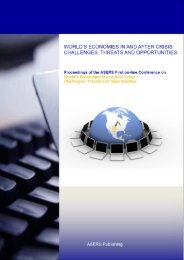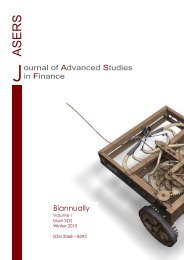Can Shift to a Funded Pension System Affect - ASERS
Can Shift to a Funded Pension System Affect - ASERS
Can Shift to a Funded Pension System Affect - ASERS
Create successful ePaper yourself
Turn your PDF publications into a flip-book with our unique Google optimized e-Paper software.
Theoretical and Practical Research in Economic Fields<br />
accumulation of delays, and confronted with a series of difficulties in the production of its latest model, Boeing<br />
decided <strong>to</strong> abandon the original fragmented chain and repatriate key production processes in its main<br />
establishments. Differentiated regional markets, as well as political pressure <strong>to</strong> voluntarily restrict exports and<br />
“build where they sell” have also encourage au<strong>to</strong>mobile constructers <strong>to</strong> relocate their final assembly closer <strong>to</strong> their<br />
final markets, keeping only the heavy engineering work truly global (Sturgeon, and van Biesebroeck 2009).<br />
Other structural fac<strong>to</strong>rs are also at work, which may increase transaction costs and push global firms <strong>to</strong><br />
reconsider their production networks. Since 2003, oil price has been increasing, reflecting, inter alia, the<br />
additional demand coming from large emerging countries. This trend is probably installed for some time now, and<br />
production mangers will have <strong>to</strong> adapt <strong>to</strong> a future where energy is more expensive and less plentifully available.<br />
The same structural fac<strong>to</strong>rs that led <strong>to</strong> an increase in the consumption of fossil fuels are also causing a change in<br />
the perception of businesses, consumers, and policy makers. Indeed, carbon footprints (accumulated CO 2<br />
emissions) calculated through the life-cycle of a product has become increasingly associated with transportation<br />
of goods within the supply chain. Using input-output matrices, Hertwich and Glenp (2009) calculates that trade<br />
margins ”representing the accumulated emissions from distribution between the producer and final consume”<br />
account for 5.5% of greenhouse gases emissions. As concerns about global warming increases, purchasing<br />
managers are concerned about the carbon footprint of their supply chains, while consumers are increasingly<br />
offered carbon-labelled products and economists talk about internalizing environment costs through ad hoc<br />
consumption taxes. As these trends accentuate, there will be a natural tendency <strong>to</strong> shorten global supply rely<br />
more on regional or domestic networks.<br />
If this trend is confirmed, these underlying deglobalization forces would hinder the medium-term<br />
possibilities of recovery for international trade at its pre-crisis level. Because the most dynamic markets are in<br />
emerging countries, a regionalization or a repatriation of global supply chain would negatively affect developed<br />
countries‟ exports of intermediate goods, slowing down their recovery and augmenting the risk for an L shaped<br />
exit pattern. But because global supply chains are a source of efficiency gains and technical progress diffusion<br />
(see Box 1 again), even emerging countries would see their potential growth reduced in the process.<br />
More importantly, it may also deprive the poorest developing countries, located far from established or<br />
emerging markets, of the opportunities of following the industrialization path taken by China or Mexico, a powerful<br />
strategy for frog-leaping through the Ros<strong>to</strong>vian take-off model by attracting foreign direct investment, creating<br />
large volume of manufacturing jobs and transferring technologies (Box 2). Thus the micro-economic debate on<br />
the future of global supply chains spills over very critical trade and development issues.<br />
Yet, against this pessimistic outcome, many considerations militate in favour of productive network<br />
continuing <strong>to</strong> extend their global reach. In the short run, abandoning the present global network of suppliers<br />
carries a heavy cost for the multinational firms. Off-shoring has been a central objective of many key industries,<br />
which heavily invested in their international network. Often, the new plants build off-shore are more modern and<br />
efficient than the older domestic ones, and selling them <strong>to</strong> a competi<strong>to</strong>r would create a comparative disadvantage<br />
(remember the dilemma of GM with the sale of Opel).<br />
In the longer run, the constant flow of innovations and the extension of the technological frontier are<br />
lowering the cost of communication, creating new opportunities for redesigning the international division of labour.<br />
Box 2. Global Supply Chains, Industrialization and Development<br />
There is a heated debate, reminiscent of the 1970s controversies about the role of trans-national<br />
corporations, between the liberal and the heterodox schools on the role of global supply chains in<br />
fostering industrialization or, at the contrary, causing “inmisering growth”, low labour standards and more<br />
informality.<br />
The establishment of export processing zones (EPZs) in developing countries and their success<br />
in attracting foreign direct investment have usually been balanced by a bias <strong>to</strong>wards a low qualification<br />
and low salary profile for their employees. Because the establishments in EPzs in least advanced<br />
countries are predominantly labour intensive and foot-loose industries (e.g., apparel and garments),<br />
critics <strong>to</strong> an industrial strategy based on processing industries point <strong>to</strong> 1. their lack of backward and<br />
forward linkages with other domestic industries; 2. their reliance on informal markets <strong>to</strong> lower labour<br />
costs; and 3. their sensitivity <strong>to</strong> conjunctural downturns. Partial field data from Asian countries on the<br />
impact of the crisis show declines in both average working hours and average earnings, especially in<br />
footwear and furniture industries. In addition, it seems that the crisis hurts more the formal sec<strong>to</strong>r, while<br />
the informal sec<strong>to</strong>r saw increases in average working hours (Hurst, Buttle, and Sandars 2009).<br />
The controversy is partially based on an erroneous supposition that inward oriented<br />
(domestically integrated) and outward oriented (globally connected <strong>to</strong> supply chains) industrialization<br />
processes are mutually exclusive forms of industrialization for developing countries. It needs not being<br />
36











